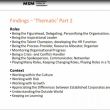Leading the journey from start-up to scaled-up organisations – online DBA defense
Mr. Martin Tynan successfully defended his DBA thesis online titled Leading the Journey from Start-up to Scaled-up Organisations: The evolution of entrepreneurial leadership practice during organizational growth in technology-focused organisations – A Roadmap for Stakeholders.
About the research
Recently established high-growth, technology- focused organisations are bringing new and innovative products to the market at an extremely rapid pace. Examples of these types of organisations such as Amazon, Facebook, Google, LinkedIn, and the products they provide to consumers and businesses are changing how we interact and engage with each other on an individual, societal and on an organisational level. A commonality between this type of company is, firstly, their relatively short organisational life span, often they are only 10-15 years old, and secondly, how rapidly they have grown or scaled into multi-billion-dollar organisations. This research study aims to explore this type of organisation after they have made the transition from the ‘start-up’ to the ‘scale-up’ phase of organisational growth, and to understand the specific entrepreneurial leadership motivators, behaviours and roles (sometimes impacted by elements of context) which supported them in making this transition. The research study looks at a sample of leaders of technology-focused, high-growth companies, based in the London area of the UK, which have made this transition. What are the main commonalities amongst their Leadership capabilities and competencies which, by inference, played a part in this process? Mr. Tynan suggests that insights into these can help investors and other stakeholders differentiate between potential winners and losers in this journey from start-up to scaled-up phase of an organisation.
This research study, based on in-depth, semi-structured interviews with ten respondents who were members of successful entrepreneurial leadership teams, concluded (in line with much of the literature accessed) that leader motivators, behaviours and roles, evolved significantly. Mr. Tynan identified specifically eleven dimensions. Leaders surviving and indeed flourishing in the transitional journey were seen as capable of evolving between (and embracing both sides of) a series of binary contexts, able to discard one and adopt the other according to contextual pressures. Thus, the entrepreneurial leader must cope with evolving dichotomies in a positive way. The major contribution of the researcher was arguably to identify these eleven dimensions:
- external-internal orientation;
- control/autonomy-delegation;
- solving-anticipating problems;
- wide-narrow range of leader behaviours;
- high-low risk tolerance of mistakes;
- low-high role clarity requirement;
- evolving-codified cultural context;
- low-high vision related to reality;
- old-new vision represented by leader as figurehead;
- high-low risk of single points of failure from each new hire;
- Unstructured-hierarchical organisational context.
Based on these eleven dimensions, Mr. Tynan also produced a basic diagnostic tool as a further possibility of a practical application of his research. He suggests that testing this tool could be an important area for further research.
Related news
Factors influencing Export Market Effectiveness – DBA defense
Developing the diamond cutting and polishing industry in Namibia – DBA defense
Developing a Contract Farming Framework for Smallholder Farmers in Tanzania – DBA defense

